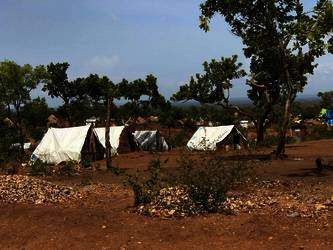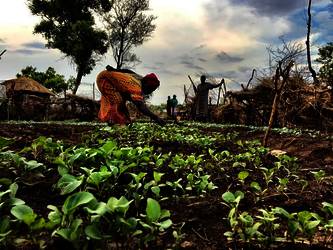Future Now
The IFTF Blog
A Bold Experiment in Uganda
Refugee settlement as a prelude to the city of the future?
IFTF Fellow Mike Zuckerman reimagines the future of migrant populations
 Today is World Refugee Day, and IFTF Fellow Mike Zuckerman has been on the ground in the world’s oldest refugee settlement—the Nakivale settlement in South Western Uganda—where he participated in a 5K race with members of the first ever refugee Olympic team from Rio.
Today is World Refugee Day, and IFTF Fellow Mike Zuckerman has been on the ground in the world’s oldest refugee settlement—the Nakivale settlement in South Western Uganda—where he participated in a 5K race with members of the first ever refugee Olympic team from Rio.
But Zuckerman has more than running on his mind. Drawing on the lessons he learned in his launch of the worldwide [freespace] movement and seeking to lessen suffering in the midst of human crises like that unfolding in Uganda today, he is reimagining what a refugee settlement can be. In a world of rapid change, he’s working to redefine the minimum viable requirements for communities in transition. And in the process, he may actually be laying the tracks for the future evolution of entire cities around the globe.
The Ugandan crisis: more than food and medicine
In recent months, Uganda has become ground zero for humanitarian relief as refugees, primarily from the conflict and famine in South Sudan, pour into the country by the thousands daily. They are anticipated to reach 1 million before the end of the year. The largest camp is in the north: BidiBidi is currently home to 300,000 refugees and has now closed its doors to newcomers. Nakivale in the southwest offers refuge to about 170,000. Across the country, traditional humanitarian aid is failing to keep pace with the need.
Both settlements remind Zuckerman of the conditions refugees faced in Greece last summer when he piloted a novel approach to settlement housing. “Space is a technology,” he says. “It’s where change happens and futures are built. Elpida [the camp Mike organized in Greece] was about using underutilized physical spaces to the meet the needs of displaced people. This approach grows out of the civic hacking tradition of rapid prototyping, unlocking latent resources, and creatively negotiating local and legal administrative barriers. In the end, it’s about building emergent, open community spaces that can quickly adapt to the needs of self-organizing transient populations.”
It turns out that Uganda is a perfect place to experiment with this vision because the country already has a policy of providing refugees with access to basic assets like land, food, and education. The problem is that the massive in-flow of refugees has overwhelmed the bureaucratic processes of housing and sustaining refugees (85% of whom are women and children). Many are thus caught in the same kind of miserable waiting game that Zuckerman encountered in Greece—with inadequate food, shelter, and community.
“What’s most important,” he says, “is the self-organizing, self-empowered open community. This is the template we’re trying to prototype here in Uganda.”
A bold experiment in universal basic assets
 The Ugandan refugee policy is unique in the world. It’s a social experiment in what Marina Gorbis, IFTF Executive Director, calls universal basic assets (UBA), a safety net of access to the essential requirements of life and livelihood. While these assets can be owned privately—for example, by giving refugees a deed to a small plot of land for subsistence farming—Gorbis argues that public and especially open assets are ultimately necessary to assure widespread prosperity in a population.
The Ugandan refugee policy is unique in the world. It’s a social experiment in what Marina Gorbis, IFTF Executive Director, calls universal basic assets (UBA), a safety net of access to the essential requirements of life and livelihood. While these assets can be owned privately—for example, by giving refugees a deed to a small plot of land for subsistence farming—Gorbis argues that public and especially open assets are ultimately necessary to assure widespread prosperity in a population.
Prosperity is not a term that’s bandied about in refugee settlements. “But why not?” asks Zuckerman. Instead of treating refugees as helpless victims confined to tents while they wait for bureaucratic processes to parcel them out to more permanent homes, why not empower them with access to open spaces, open infrastructures, open capital, data, and knowledge? Why not tap their innate
capacity and inclination to create community and set up their own rules for engagement in that community?
This is what Zuckerman has been up to in Uganda. He’s evangelizing community-owned and community-sustained spaces within the settlements. And he sees this kind of open, bottom-up approach as a template for building not just the future of refugee settlements, but also the future of cities worldwide.
In search of the minimum viable city
Every city in Europe had its start as a refugee camp, argues Zuckerman, starting with the Roman encampments. Over the centuries, these cities have evolved into places of wealth, of art, of invention. Unfortunately, they have also evolved into places of bureaucracy and barriers to economic mobility. Zuckerman is looking for the formula that minimizes bureaucracy while maximizing community and its self-directing potential. He’s looking, really, for the minimum viable city.
The first step is funding an experiment called NONGO to begin organizing bottom-up refugee communities in Uganda without reliance on over-professionalized NGOs. Announced on May 5 of this year, it’s an experiment to find out what are the minimum basic assets, from organizational structures to capital to community spaces, to build a future for Uganda. One such asset is what Zuckerman has dubbed the Uganda Country Director for NONGO, and in two hours, he was able to crowdfund the director’s salary for a year on Facebook.
“The minimum viable city of the future,” says Gorbis, “will likely be built on the back of universal basic assets. The cultures of these future cities will blend private, public, and open access to these assets in ways that we’re just beginning to experiment with around the world. Zuckerman’s experiment in Uganda—indeed the entire Ugandan refugee experiment—is a lead indicator of how we can rethink human communities to make them responsive to the rapid and extreme changes we will face over the coming decades.”
For more information
For more information about Mike's work with refugees:
Listen to his story about refugee experiments in Greece as part of IFTF's podcast series, For Future Reference.
For more information about IFTF's research and forecasting, please contact:
Sean Ness: (650) 233-9517 | sness@iftf.org
For media inquiries, please contact:
Erin Musgrave: (530) 864-7014 | emusgrave@affiliates.iftf.org
Jean Hagan: (650) 233-9551 | jhagan@iftf.org




